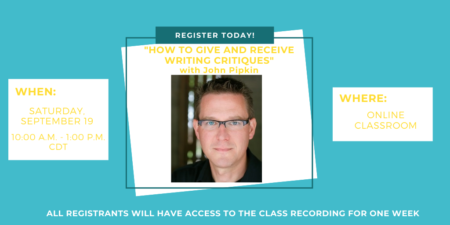
Are you in a writing group but not sure how to give good feedback on others’ work?
NOTE: This class is required in order to sign up for one of our Advanced Craft Workshops, but does not guarantee admission. The price of this online class will go toward the cost of the workshop if accepted as a participating student. (Good toward first workshop only.) For more information on our advanced MFA-style workshops, click HERE.
Giving and receiving feedback is a learned skill that writers can develop and hone, and learning how to participate in and benefit from a workshop can be invaluable to any writer looking to take their craft to the next level. Allowing other writers to critique your work in a group setting (where you critique their work in turn) offers fresh eyes and a fresh perspective, helps you to zero in on problems you might be overlooking, strengthens your skills as a reader, and opens the way to communing with your peers in a safe, nurturing environment.
In this class, participants will learn what to consider when reading works with a critical eye, including how to identify what is working within a piece and, just as important, what isn’t working and why, and how to identify the narrative structure and rhetorical strategies at work; how to “read like a writer” including tools for better understanding the technical aspects of storytelling and how to apply those techniques to your own stories; how to give feedback in a helpful and constructive way; and how to accept feedback in a workshop and how to apply it to your work-in-progress. http://www.writersleague.org/calendar/GiveandReceiveCritiquesPipkin2020
TAKE THIS CLASS IF
- You’re not sure how to discuss craft in a practical way that allows you to give concrete advice.
- You want to become better at translating others’ advice for your writing into practical strategies you can use.
- You want to learn how to identify the strengths and weaknesses of stories on a structural level.
ABOUT THE INSTRUCTOR
John Pipkin is the Director of the Undergraduate Creative Writing Program at UT-Austin. Originally from Baltimore, he received a Ph.D. in English from Rice University. His first novel, “Woodsburner” (Nan A. Talese/Doubleday 2009) won the New York Center for Fiction First Novel Prize, the Massachusetts Center for the Book Novel Prize, and the Texas Institute of Letters Stephen Turner Prize. His second novel, “The Blind Astronomer’s Daughter”(Bloomsbury 2016) was named Book of the Month by The London Times. John has received fellowships from MacDowell, Yaddo, and Dobie-Paisano, and he is currently completing a novel about the Tour de France during WWII.
